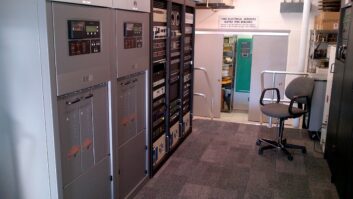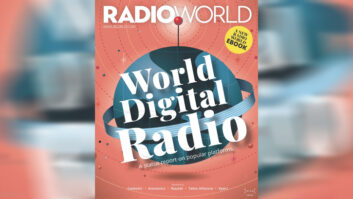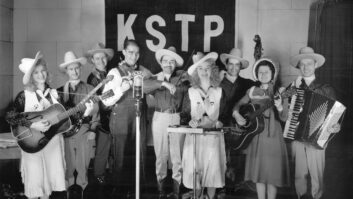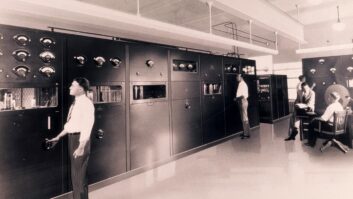MONTREAL — What do you do if you’re a Quebec media company that already owns TV stations and newspapers, but is barred from launching radio stations due to Canadian broadcast law? Answer: You bypass the broadcast regulator’s restrictive rules by launching an internet radio/podcasting service out of its legal reach, and promote the daylights out of it on your TV/newspaper properties.

This is precisely what Quebecor did on Oct. 4, 2018, when it launched QUB radio.
“Instead of tuning to an AM or FM channel, QUB radio is a 100 percent digital platform for broadcasting audio content and podcast, available on the website www.qub.radio and the QUB radio [Android/iOS],” said Jean-Nicolas Gagné, head of QUB radio. “QUB radio can also be found on the websites of the Journal de Montréal, Journal de Québec and TVA Nouvelles as well as on TVA Nouvelles and J5 Apps. In addition, QUB radio is available on broadcast platforms such as TuneIn and others.”
“It goes without saying that one of the largest media groups in Quebec had to position itself by embarking in what we believe is the future,” he added.
THE CLOUT OF CONTROVERSY
The fact that Quebecor has launched its own internet radio/podcasting service is, in itself, not unique. After all, “most major media (outlets) have traditional radio stations, and open a digital version later,” said Gagné. In contrast, Quebecor “started directly with a digital platform.”
What does make QUB radio unique is the station’s programming strategy, which is to target mainstream French-language listeners who love the brash, rude rants of Quebec talk radio hosts. By offering popular on-air talents such as Mario Dumont, Benoit Dutrizac, Richard Martineau and Sophie Durocher to QUB radio’s potential listeners, Quebecor is hoping to get them to tune in via computer and smartphone (including via Wi-Fi in the car); and to tune away from their regular AM/FM stations.

“Quebecor has put together a powerful stable of controversial talk radio hosts on a platform the CRTC [Canadian Radio-television and Telecommunications Commission] has no authority over,” said Steve Kowch, Canadian media consultant and president of kowchmedia in Toronto. “Some have been fired in the past for their opinions while others like popular politicians are making a return to radio via internet on QUB. On the web, there are few rules if any to get in the way of ‘free speech’ no matter how controversial, rude, politically incorrect and yes, even racist or hate speech their comments might be.” In response to this comment, Gagné replied “QUB radio does not tolerate racist and hate speech.”
The fact that QUB radio cannot be censored by the CRTC gives this channel an edge over its AM/FM competitors; especially in Quebec, where fans of French-language talk radio are no fonder of government regulation than American talk radio fans south of the Canadian-U.S. border. By allowing its hosts to say what they want, QUB radio can harness a reputation for fearlessness; much like U.S. “shock jock” Howard Stern who was forced off Canadian radio stations by regulators years ago.
THE POWER OF PROMOTION
Tapping into the French-speaking “Québécois” love of iconoclastic talk radio is a good way for Quebecor to make waves in the province’s radio market. But motivating them to tune in via the web and smartphones is something else — which is where Quebecor’s strong stable of TV stations, newspapers, and related websites come into the picture. By promoting QUB radio relentlessly on the company’s established media platforms, Quebecor will have no problem making Québécois aware of this readily-available alternative to AM/FM radio.
“It is our business model to circulate content on our various platforms to give them as much visibility as possible,” said Gagné, “For the launch of QUB radio, we came out with a strong media and PR campaign, which gave us an incredible visibility. Besides, our radio hosts are well known, their tweets and Facebook publications brings a lot of traffic to QUB radio.”
“Quebecor has newspapers across Quebec that will promote QUB to build an audience,” agreed Kowch. “Quebecor owns the Journal de Montreal. It is a tabloid much like the Toronto Sun, New York Post and British tabloids which push the limit. The Journal de Montreal ranks number one because of its no holds barred journalism, controversial columnists and sports coverage.”
“Quebecor also has an impressive sales force that will be tapped to sell adverting on QUB and offer deals to existing print advertisers to buy spots on the new digital radio station,” he added. “Quebecor has deep pockets and QUB will be a vanity project for owner/CEO Pierre Karl Péladeau; a former leader of Quebec’s separatist Parti Quebecois.”

A VIABLE CHALLENGE TO QUEBEC RADIO?
According to QUB radio’s Jean-Nicolas Gagné, his online station is a viable competitive alternative to Quebec’s AM/FM radio stations. “Ninety two percent of Quebec’s population has an internet connection at home.” he said. “So we are very confident that our model will be adopted by the masses. We also felt it was time for Quebecor to offer digital online radio because consumer habits clearly show us that consumers are ready for it.”
Toronto media consultant David Bray, president of Bray & Partners Communications, isn’t so sure. While terrestrial radio is somewhat outdated from a technological perspective, it remains extremely popular overall, consistently delivering in excess of a 92 percent reach rate,” said Bray. “The vast majority of radio tuning goes to terrestrial radio as opposed to online only.”
“I understand that Quebecor is launching their new service online due to a variety of regulatory concerns keeping them out of terrestrial radio: This certainly makes sense,” he added. “I have no doubt that their new online station will have some excellent content and will offer an exciting alternative to listeners. But keep in mind that listening on your phone, except where there is Wi-Fi, is not free.”
Steve Kowch doesn’t see the potential expense of listening to QUB radio on smartphones as a deal-breaker for listeners. But he does see risks associated with this project, which are similar to those faced by conventional radio broadcasters.
In particular, “QUB will live or die with its online product. Listeners, not regulators, will control its destiny,” he said. Meanwhile, “Advertisers can be skittish and if potential clients complain too much, they might pull their spots on a particular show. But in French Quebec, there is a lot more tolerance by the audience for shock jocks than in English Canada.”
[Read: NRG Radio Pioneers Digital Convergence in Kenya]
How much impact QUB radio will have on Quebec’s AM/FM radio market remains to be seen. Also unknown is how much time Quebecor will give QUB to become profitable through ad sales, before pulling the plug. (As a successful media company, Quebecor likely knows the financial risks it is running with QUB, down to the penny.)
What Gagné will say is that QUB radio has “reached more then 100,000 downloads of the QUB radio app in less then a month, which is huge for our market!” Time will tell if these downloads and online tuning will translate into enough listeners and ad sales to make QUB commercially viable over the long-term.
James Careless reports on the industry for Radio World from Ottawa, Ontario.







